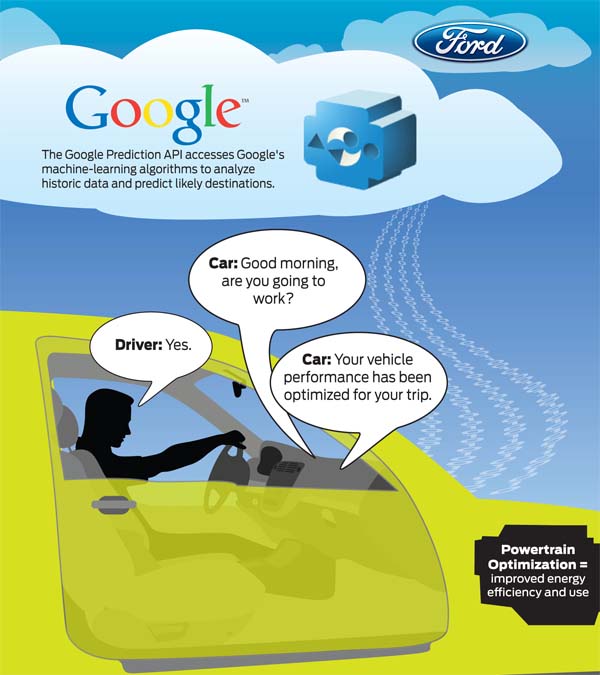 You know what Google does well, aside from making money? Collecting data. And now Ford plans to take advantage of that data to improve energy efficiency in its cars.
You know what Google does well, aside from making money? Collecting data. And now Ford plans to take advantage of that data to improve energy efficiency in its cars.
Announced at Google’s IO event, Ford are planning on introducing Google’s prediction API to its vehicles to enhance efficiency. The API takes recorded data from previous trips, and extrapolates that to predict future behaviours. For example, the API may recognise that you regularly travel to work at a certain time, travelling along the same route. So when you hop in the car at the same time of day, it can predict that you are going to travel to work again, and adjust the car’s performance to match the conditions of the drive.
Or, as Ford describes in its announcement:
How it works
Ford is hoping to use these types of cloud-stored data to enable a vehicle essentially to optimize itself and perform in the best manner determined by a predicted route.This week, Ford researchers are presenting a conceptual case of how the Google Prediction API could alter the performance of a plug-in hybrid electric vehicle at the 2011 Google I/O developer conference. In this theoretical situation, here’s how the technology could work:
• After a vehicle owner opts in to use the service, an encrypted driver data usage profile is built based on routes and time of travel. In essence, the system learns key information about how the driver is using the vehicle.
• Upon starting the vehicle, Google Prediction will use historical driving behaviour to evaluate given the current time of day and location to develop a prediction of the most likely destination and how to optimize driving performance to and from that location.
• An on-board computer might say, “Good morning, are you going to work?” If the driver is in fact going to work, the response would be, “Yes,” and then an optimised powertrain control strategy would be created for the trip. A predicted route of travel could include an area restricted to electric-only driving. Therefore, the plug-in hybrid could program itself to optimise energy usage over the total distance of the route in order to preserve enough battery power to switch to all-electric mode when traveling within the EV-only zone.
Of course, all this takes a whole heap of processing power, which essentially means that it all needs to be done up in the cloud. Transmitting large amounts of information about your location to servers on the cloud may not be everybody’s idea of an ideal privacy situation, which is a hurdle Ford know they need to jump before this kind of system can become common place. But given the potential benefit to both the environment and the customers wallet, it’s a challenge worth pursuing.